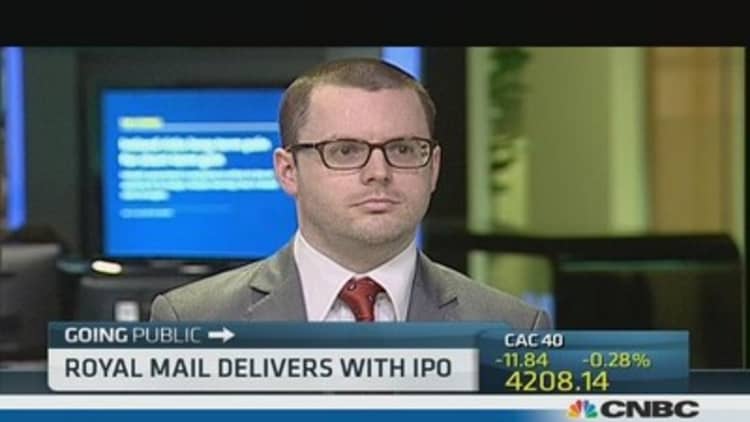The U.K.'s recently privatized Royal Mail reported a hike in first-half profit on Wednesday, amid continuing concerns that it was sold off too cheaply when it floated in October.
In its first financial results as a listed company, Britain's postal service said cost-cutting and rising parcel revenue helped it almost double first-half operating profit to £283 million ($458 million).
The results came on the same day that U.K. Business Secretary Vince Cable was quizzed by British lawmakers about the privatization of the near 500-year-old business and whether its shares were sold too cheaply. It was the British government's largest privatization in over 20 years.
(Read more: Landsdowne grabshuge stake in Royal Mail sell-off)
Royal Mail shares were priced at 330p when it floated in October – the top of the range - valuing the company at £3.3 billion.
But shares closed at 489p on the first full day of trading, and reached 587p earlier this month, boosting concerns that the company was undervalued at its IPO. On Wednesday shares were 5.7 percent higher at 563p.
The Bow Group think tank - led by former British Prime Minister John Major – last week called for an independent investigation into the valuation, which it described as a "short-sighted firesale."
And the Communication Workers Union (CWU), which represents postal workers, has said the government failed to price Royal Mail correctly, and "lost the taxpayer hundreds of millions of pounds" when it was floated.
But Swiss bank UBS – one of the banks which managed the float – last week placed a sell recommendation on the stock, saying the market was "over-estimating margin upside."

Too soon?
Cable on Tuesday told the House of Common's Business, Innovation and Skills Committee that it was too soon to judge the valuation of the postal service, despite being repeatedly pushed by politicians to comment on the issue.
He stressed that trading of shares was currently in a very narrow range, and there was much disagreement among shareholders about the value of the company - both currently and looking ahead.
(Read more: Royal Mail tobe valued at up to $5.3 billion in share sale)
"There are a wide range of possible outcomes," he told lawmakers. "When precisely will we know if this is a good outcome? Three-to-six months, perhaps a year. It will be a long time before we are able to take a proper considered view about the underlying value."
For the six months to September 29, Royal Mail's operating profit (after transformation costs) of £283 million was helped by a one-off VAT credit of £25 million. This was up from £144 million reported for the same period last year.
Royal Mail said its revenue growth of two per cent – from £4.35 billion in the first half of 2012 to £4.52 billion in 2013 - was driven by strong growth in parcel revenue, which offset a decline in its letter business. Parcel sales now account for 51 percent of the group's sales.
Strike action weighs
The results were broadly welcomed by analysts, with Richard Hunter, head of equities at Hargreaves Lansdown stockbroker, saying the share price rally since flotation was central to the investment case for holding on to shares.
(Read more: British public flock to Royal Mail share offer)
"Royal Mail's opening numbers have met with a warm reception, despite increasingly loud whispers of valuation concerns," he said in a note.
Hunter stressed that the "terminal" decline of the letters business was a challenge, but added: "That being said, most of the key metrics are moving in the right direction, helped along by a tight rein on costs, lower-than-expected transformational expenditure and a focus on the important area of margin expansion."
While Joe Rundle, head of trading at ETX Capital, described the results as respectable, but highlighted that the company had mentioned that the fear of strike action had led to a slowdown in the rate of business customer acquisition in its parcel division.
"(This is) an indication that the perceived threat of strike has naturally pushed customers to chose rivals," he said in a note Wednesday. "This could weigh on the company's performance so long as there's the threat of industrial action in the pipeline."
The CWU is currently in dispute with Royal Mail over pay and job terms and conditions. On Tuesday the union announced that it had agreed to extend a deadline for an agreement until December 3 – the last date that notice of strike action can be served.
—By CNBC's Katrina Bishop. Follow her on Twitter @KatrinaBishop and Google


